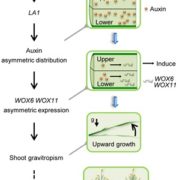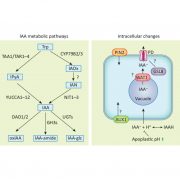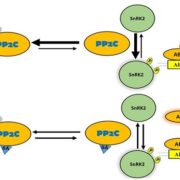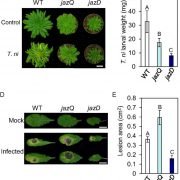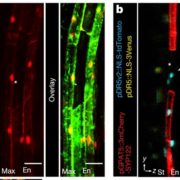Arabidopsis duodecuple mutant of PYL ABA receptors reveals PYL repression of ABA-independent SnRK2 activity
 Abscisic acid (ABA) is a plant hormone involved in many plant processes – from seed maturation to drought responses. ABA is perceived by intracellular pyrabactin resistance and PYR-like family (PYR/PYL) receptors, counting 14 genes in Arabidopsis, representing the largest family of plant receptors. Although individual PYLs differ in their expression patterns, it is hard to dissect ABA-dependent processes due to some degree of redundancy. Zhao and colleagues generated a duodecuple mutant, knocking out 12 out of 14 PYL genes using a combination of T-DNA insertion lines and CRISPR/Cas9 gene silencing. The 12-fold mutant was resistant to ABA-induced inhibition of germination, growth and closing of the stomata. Mutation of twelve ABA receptors reduced the transcriptional responses to ABA by 93%. Interestingly, only 54% of transcriptional responses to osmotic treatment were impaired in the twelve-fold mutant, suggesting that roughly half of the plant osmotic responses is regulated independently of ABA. (Summary by Magdalena Julkowska) Cell Reports 10.1016/j.celrep.2018.05.044
Abscisic acid (ABA) is a plant hormone involved in many plant processes – from seed maturation to drought responses. ABA is perceived by intracellular pyrabactin resistance and PYR-like family (PYR/PYL) receptors, counting 14 genes in Arabidopsis, representing the largest family of plant receptors. Although individual PYLs differ in their expression patterns, it is hard to dissect ABA-dependent processes due to some degree of redundancy. Zhao and colleagues generated a duodecuple mutant, knocking out 12 out of 14 PYL genes using a combination of T-DNA insertion lines and CRISPR/Cas9 gene silencing. The 12-fold mutant was resistant to ABA-induced inhibition of germination, growth and closing of the stomata. Mutation of twelve ABA receptors reduced the transcriptional responses to ABA by 93%. Interestingly, only 54% of transcriptional responses to osmotic treatment were impaired in the twelve-fold mutant, suggesting that roughly half of the plant osmotic responses is regulated independently of ABA. (Summary by Magdalena Julkowska) Cell Reports 10.1016/j.celrep.2018.05.044


